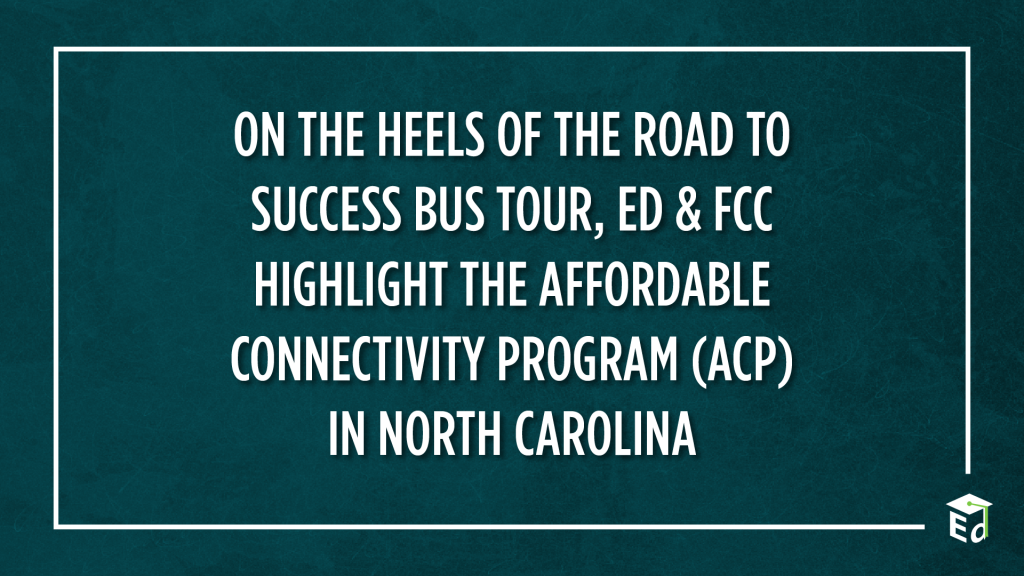
By: Lauren Mendoza, Deputy Assistant Secretary for State and Local Outreach, Office of Communication and Outreach
Recently, representatives of the Department of Education (ED) and the Federal Communications Commission (FCC) visited Charlotte and Durham, North Carolina for conversations on partnerships between schools and community-based organizations to implement the Affordable Connectivity Program (ACP). ACP, which was established in the Bipartisan Infrastructure Law, provides eligible households discounts of up to $30 per month on internet service and a one-time $100 discount for a connected device. These conversations, which followed the Road to Success Back to School Bus Tour stop in Greensboro, NC, highlighted the impact of ACP and community-led efforts in removing broadband affordability and adoption barriers, allowing more students and families to benefit from transformative learning opportunities empowered through technology.
Following visits to four Charlotte schools on Monday, Deputy Secretary Cindy Marten joined the Center for Digital Equity (CDE) and their digital navigators on Tuesday in engaging families about the ACP, followed by a roundtable discussion at Southside Homes with representatives of ED, FCC, CDE, Inlivian, the Charlotte-Mecklenburg School Board, Learning Help Centers of Charlotte (LHCC), and Save Our Children, as well as parents and residents. Roundtable participants emphasized the importance of engaging community members in developing implementation plans to ensure that strategies meet the most pressing needs. For example, participants highlighted that while efforts can be made to streamline enrollment in programs like the ACP, leveraging trusted messengers from the community are essential to deploying strategies that meet households where they are to overcome adoption barriers. These may include using multi-lingual communications to increase awareness, addressing apprehension and unfamiliarity with technology, and other common, personal issues.
Summarizing the conversation, Bruce Clark, CDE’s Executive Director, noted: “One of the biggest takeaways from Deputy Secretary Marten’s visit to Charlotte was how [ED] is helping schools and communities think about the impact digital equity has in both school and the home. Solving for both is critical to ensuring all youth have the opportunity to learn and explore wherever they are.”
On Wednesday, Digital Durham hosted a roundtable discussion at the Kramden Institute with representatives of its member organizations, city leaders, ED, and FCC. Laura Fogle, founder of Digital Durham, explained: “Durham is a center of technology innovation with a major research university and a growing number of tech companies, but many residents still don’t have access to the basic technology resources they need. Through its members and partners, Digital Durham helps eligible households sign up for internet discounts; gives away computers and loans hot spots; and trains kids, parents, and grandparents how to use technology to do essential tasks. Together we connect families to the technology resources they need to learn and thrive in our modern digital world.”
Similar to the previous day’s roundtable, participants referenced ongoing barriers to ensuring families have access to reliable, high-speed internet, especially in a city where census blocks a few miles away have drastically different adoption rates. This includes “technology-centric” issues such as individuals running out of data on mobile hotspots and limited supplies of loaner equipment, but also “people-centric” issues such as lack of digital literacy. The ACP and its associated FCC outreach grants will help address these issues, however, they encouraged streamlining enrollment and certification of eligibility to make it as easy as possible for households to participate and emphasized the need for sustainable funding.
The roundtable was followed by tours of Kramden, including its device refurbishing facilities; Club Boulevard Elementary School, where Digital Durham and Durham Public Schools announced a partnership to promote ACP to families across the district; and Durham County Library, which helps to bridge the digital divide and promote digital literacy through its digital navigators, as well as through its Tech Mobile and device and hotspot loan program.
Under the President’s GetInternet Initiative, many internet service providers offer high-speed plans that are fully covered by ACP – meaning millions of families can now get high-speed internet without paying a dime. As of September 2022, more than 13.5 million households have taken advantage of the ACP, however, an estimated 48 million households qualify. GetInternet.gov is a one-stop shop to check eligibility and sign up. Moreover, the White House released a Back to School ACP Toolkit with a ready-to-use backpack flyer that schools and community partners may use to help students and their families enroll.
For more recommendations on equitable broadband adoption, read the new resource, Advancing Digital Equity for All.

